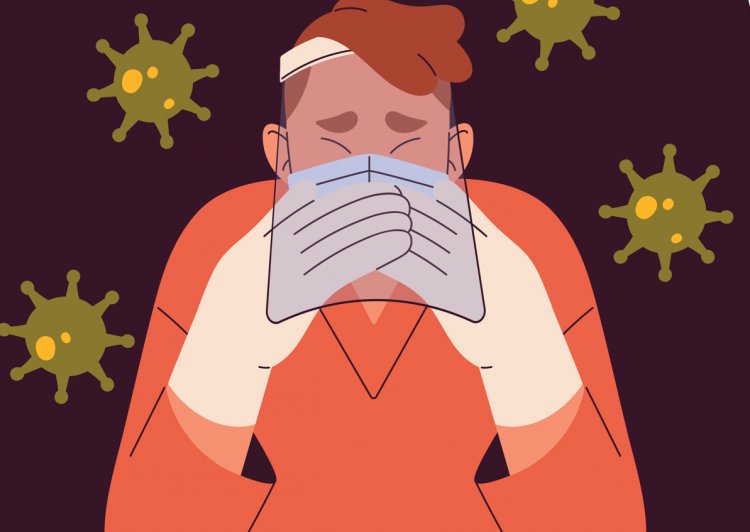Nosophobia: The Fear of Disease
Nosophobia, from the Greek words "nosos" (disease) and "phobos" (fear), refers to an intense and irrational fear of contracting a disease. It is often confused with hypochondria, but while hypochondriacs believe they are already ill, nosophobes fear becoming ill. This condition, also known as illness anxiety disorder or health anxiety, has significant effects on an individual's mental and physical well-being.

Symptoms of Nosophobia
Individuals with nosophobia exhibit various symptoms that disrupt their daily lives. These symptoms include:
Excessive Worry
- Persistent and disproportionate concern about contracting serious illnesses, despite reassurances from medical professionals.
- Anxiety may be triggered by media reports, medical information, or news of others' illnesses.
Compulsive Behaviors
- Repeatedly checking body temperature, blood pressure, and other vital signs.
- Frequently inspecting the body for signs of illness, such as lumps, rashes, or other abnormalities.
- Seeking constant medical reassurance from doctors, often visiting multiple healthcare providers.
Avoidance
- Avoiding hospitals, clinics, or places perceived as sources of infection.
- Shunning public transportation, social gatherings, or crowded places to minimize the risk of exposure to germs.
- Steering clear of individuals who are sick or who might have been exposed to illness.
Physical Symptoms
- Experiencing real physical symptoms such as headaches, stomach aches, muscle tension, or palpitations, which are often psychosomatic and result from heightened anxiety.
Impact on Daily Life
- Difficulty concentrating at work or school due to preoccupation with health concerns.
- Disrupted sleep patterns, including insomnia or nightmares about illness.
- Strain on personal relationships as the individual may constantly seek reassurance or avoid social interactions.
Causes of Nosophobia
The precise cause of nosophobia is not well understood, but several factors are believed to contribute to its development:
Genetic Predisposition
- A family history of anxiety disorders can increase the likelihood of developing nosophobia.
- Genetic factors may influence an individual’s susceptibility to anxiety and fear-based disorders.
Psychological Factors
- Past traumatic experiences with illness, either personally or witnessing a loved one suffer, can trigger nosophobia.
- Personality traits such as perfectionism, a tendency towards negative thinking, and high sensitivity to stress.
Environmental Influences
- Constant exposure to health-related news and sensationalized media reports about disease outbreaks.
- The recent COVID-19 pandemic has significantly increased global health anxieties, potentially leading to a rise in nosophobia cases.
Diagnosis and Treatment
Diagnosing nosophobia involves a comprehensive evaluation by a mental health professional, which includes:
Detailed Patient History
- Gathering information about the patient’s health concerns, behaviors, and the impact on their daily life.
- Assessing any previous medical history or traumatic experiences related to illness.
Assessment of Symptoms
- Identifying the specific fears and behaviors associated with the condition.
- Differentiating nosophobia from other anxiety disorders or medical conditions.
Ruling Out Other Conditions
- Ensuring that physical symptoms are not caused by an underlying medical condition.
- Considering differential diagnoses such as obsessive-compulsive disorder (OCD) or generalized anxiety disorder (GAD).
Treatment Options
Effective treatment for nosophobia typically involves a combination of therapies and, in some cases, medication:
Cognitive-Behavioral Therapy (CBT)
- CBT is the most effective treatment, focusing on changing negative thought patterns and behaviors associated with health anxiety.
- Techniques include exposure therapy, where patients are gradually exposed to their fears in a controlled manner, and cognitive restructuring to challenge irrational beliefs.
- Mindfulness-based CBT helps patients become aware of their thoughts and feelings without reacting to them.
Medication
- Antidepressants such as selective serotonin reuptake inhibitors (SSRIs) can help reduce anxiety symptoms.
- Anti-anxiety medications may be prescribed for short-term relief in severe cases.
Mindfulness and Relaxation Techniques
- Practices such as mindfulness meditation, yoga, and progressive muscle relaxation can help reduce overall anxiety and improve coping mechanisms.
- Breathing exercises and guided imagery to manage acute anxiety episodes.
Psychoeducation
- Educating patients about the nature of their disorder and the role of anxiety in amplifying their fears.
- Providing information on healthy lifestyle choices to promote overall well-being.
Impact on Life
Nosophobia can profoundly affect an individual's quality of life:
Social Isolation
- Fear of disease can lead to avoidance of social interactions, resulting in loneliness and strained relationships.
- Isolation may further exacerbate anxiety and depression.
Professional Impact
- Difficulty concentrating and preoccupation with health concerns can impair job performance.
- Excessive sick leave and reluctance to engage in work-related activities can jeopardize career prospects.
Emotional Distress
- Constant worry and fear can lead to chronic stress, contributing to physical health problems such as high blood pressure and weakened immune function.
- The emotional burden can also trigger or worsen other mental health conditions, such as depression.
In conclusion, nosophobia is a serious and debilitating condition that goes beyond typical health concerns. It requires understanding and appropriate treatment to manage the overwhelming fear of disease. With proper intervention, individuals can regain control over their lives and reduce the impact of their health anxieties. Raising awareness about nosophobia is crucial, as it encourages those affected to seek help and promotes a more empathetic understanding of this anxiety disorder in society. By addressing both the psychological and environmental factors contributing to nosophobia, individuals can lead healthier, more fulfilling lives.
Disclaimer
The information provided in this article is for educational purposes only and should not be considered medical advice. If you have any health concerns or are experiencing symptoms, it is important to consult with a healthcare professional, such as a doctor or clinic, for proper diagnosis and treatment. Always seek the advice of your doctor or other qualified health provider with any questions you may have regarding a medical condition. Do not disregard professional medical advice or delay in seeking it because of something you have read in this article.
Hashtags
#Nosophobia #HealthAnxiety #MentalHealth #CBT #Mindfulness #HealthAwareness #AnxietyDisorders #Wellbeing
What's Your Reaction?





















